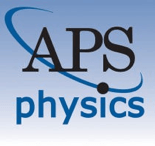
PHYSICAL REVIEW B
Scope & Guideline
Illuminating the Frontiers of Materials Science
Introduction
Aims and Scopes
- Condensed Matter Physics:
The journal focuses on the fundamental principles and phenomena of condensed matter systems, including electron correlations, magnetism, and superconductivity. - Quantum Mechanics and Quantum Computing:
Research on quantum systems, including quantum computing techniques and the quantum behaviors of many-body systems, is a major area of interest. - Materials Science:
The journal covers the synthesis, characterization, and application of novel materials, including semiconductors, topological insulators, and superconductors. - Theoretical and Computational Physics:
A significant emphasis is placed on theoretical frameworks and computational methods to understand complex physical systems and predict novel phenomena. - Magnetism and Spintronics:
Research on magnetic materials, spin dynamics, and spintronic applications is prominently featured, reflecting the journal's focus on the interplay between charge and spin.
Trending and Emerging
- Topological Phases and Phenomena:
There is a growing interest in topological insulators, semimetals, and superconductors, particularly in understanding their exotic properties and applications in quantum computing. - Quantum Materials and Devices:
Research on quantum materials, including their electronic, magnetic, and optical properties, is rapidly emerging, with a focus on applications in quantum technologies. - Non-Hermitian Physics:
The exploration of non-Hermitian systems and their implications for topological phases and quantum criticality is gaining traction, reflecting a shift towards understanding more complex systems. - Machine Learning and Data-Driven Approaches:
The integration of machine learning techniques in materials discovery and characterization is becoming increasingly prevalent, highlighting the journal's embrace of computational advancements. - Multiscale and Nonequilibrium Dynamics:
Research into multiscale systems and nonequilibrium dynamics is on the rise, indicating a shift towards understanding complex interactions in real-world materials.
Declining or Waning
- Classical Magnetism:
Research related to classical magnetism has seen a decline as interest shifts towards more exotic magnetic phenomena, such as spintronics and topological magnetism. - Traditional Superconductivity Studies:
Papers focused solely on conventional superconductivity without exploring new materials or mechanisms have decreased, as the field increasingly prioritizes high-temperature and unconventional superconductors. - Static Properties of Materials:
There is a noticeable waning interest in the static properties of materials, with more emphasis now on dynamic and nonequilibrium states. - Low-Dimensional Systems without Novel Features:
Research on low-dimensional systems that do not present unique properties or applications has become less prominent, as the field seeks more innovative and practical applications.
Similar Journals
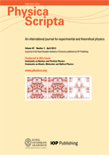
PHYSICA SCRIPTA
Advancing the Frontiers of Physics ResearchPHYSICA SCRIPTA, established in 1970 and published by IOP Publishing Ltd, is a prestigious journal dedicated to the broad fields of physics, encompassing topics such as atomic and molecular physics, condensed matter physics, and mathematical physics. With an impressive commitment to advancing scientific knowledge, it holds a significant standing in the academic community, evidenced by its Q2 and Q3 rankings across various categories in 2023. The journal is instrumental for researchers, professionals, and students seeking to disseminate and engage with high-quality research, fostering collaboration and innovation within the field. Although it currently does not offer open access options, its robust editorial standards ensure the dissemination of impactful studies, contributing to its rising citation metrics. Published from the United Kingdom, PHYSICA SCRIPTA continues to be a vital resource for contemporary developments in physics, paving the way for future discoveries.
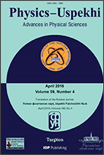
PHYSICS-USPEKHI
Exploring the Frontiers of Physics and AstronomyPHYSICS-USPEKHI, published by Uspekhi Fizicheskikh Nauk, is a prominent peer-reviewed journal in the field of physics and astronomy, reaching researchers and professionals since its inception in 1993. With an ISSN of 1063-7869 and an E-ISSN of 1468-4780, this esteemed journal has been classified as Q2 in the Physics and Astronomy category based on the 2023 quartiles, ranking 74 out of 243 journals in its Scopus classification, placing it in the 69th percentile. Although currently not an open access journal, it provides invaluable insights and advancements in the field, fostering an environment for scholarly exchange and collaborative research. Based in Moscow, Russia, PHYSICS-USPEKHI continues to shape the landscape of theoretical and experimental physics, inviting submissions that contribute to its rich legacy of high-impact scientific discourse.

PHYSICAL REVIEW LETTERS
Elevating Physics Knowledge with Every LetterPhysical Review Letters, published by the American Physical Society, is a premier journal in the field of Physics and Astronomy renowned for its rapid dissemination of high-impact research findings. With a distinguished history dating back to 1958 and an impressive ranking of #13 out of 243 in the general physics category, it stands proudly within the Q1 quartile, placing it in the top 6% of journals in its field. The journal focuses on brief reports of significant fundamental research across all areas of physics, making it an essential resource for researchers, professionals, and students seeking to stay at the forefront of developments in their field. Although Physical Review Letters does not offer open access options, its rigorous peer-review process ensures a high standard of quality and relevance in its published articles. With an unwavering commitment to advancing the understanding of physical science, this journal is indispensable for those looking to make a genuine impact in their research endeavors.

EUROPEAN PHYSICAL JOURNAL B
Fostering Innovation in the Heart of Physics ResearchEUROPEAN PHYSICAL JOURNAL B (ISSN: 1434-6028, E-ISSN: 1434-6036), published by Springer, is a prominent international journal based in Germany that focuses on the fields of Condensed Matter Physics and Electronic, Optical and Magnetic Materials. With a converged publication timeline from 1998 to 2024, it caters to a diverse audience that includes researchers, professionals, and students striving for the latest advancements in these vital areas of physics. The journal is recognized with a Q3 ranking in both relevant categories for 2023, showcasing its solid yet notable standing within the academic community. Although currently without an H-index, its Scopus rankings reflect a percentile performance of 41st and 39th, respectively, indicating a growing influence among its peers. The journal offers open access options, ensuring that groundbreaking research is widely accessible and contributes to the collective knowledge within the scientific domain. By aiming to publish high-quality, well-researched articles, the EUROPEAN PHYSICAL JOURNAL B plays a crucial role in disseminating innovative findings and fostering collaboration in the field of physics.

JOURNAL OF EXPERIMENTAL AND THEORETICAL PHYSICS
Advancing the Frontiers of Physics KnowledgeJournal of Experimental and Theoretical Physics is a distinguished publication in the field of physics, dedicated to disseminating pioneering research and fostering intellectual discourse in both experimental and theoretical domains. Published by Pleiades Publishing Inc, this journal has established itself as a crucial platform for physicists, with a commendable Q3 categorization in the 2023 rankings within Physics and Astronomy, illustrating its impactful contributions to the discipline. The journal features a wide array of articles that delve into the intricacies of physical theory, experimental techniques, and applications, making it an invaluable resource for researchers, professionals, and students alike. Although it operates under a traditional access model, its longstanding history, dating back to 1980 and converging years through to 2023, underscores its commitment to advancing the frontiers of physics knowledge. The journal is also notable for its engagement in the scientific community, aiming to bridge the gap between theoretical predictions and experimental validations. As a part of Pleiades Publishing, it continues to uphold rigorous standards of academic excellence, inviting contributions that push the boundaries of current understanding and stimulate further exploration in the fascinating world of physics.

ACTA PHYSICA SINICA
Championing Quality Research in Physics and BeyondACTA PHYSICA SINICA is a prominent journal published by the Chinese Physical Society, dedicated to the dissemination of groundbreaking research in the field of physics and astronomy. Established in 1993, this journal has consistently contributed to the scientific community by publishing high-quality articles that cover a wide range of topics within general physics and related disciplines. Although currently classified in Q4 of the physics and astronomy category by Scopus, ACTA PHYSICA SINICA plays an important role in fostering collaboration and communication among researchers in China and around the world. With a substantial readership, this journal is poised to remain a valuable resource for professionals, researchers, and students alike. By providing in-depth analysis and insights, it aims to advance the understanding and application of physical principles in various technological and scientific advancements. The journal is accessible via subscription, ensuring that contributors and readers can engage with the evolving landscape of physics research. For more information, visit the publisher's website.
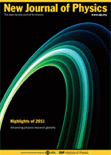
NEW JOURNAL OF PHYSICS
Transforming research into accessible knowledge for all.NEW JOURNAL OF PHYSICS, published by IOP Publishing Ltd, is a prestigious open-access journal that has been at the forefront of the physics community since its inception in 1998. With an impact factor that places it in the Q1 category of Physics and Astronomy (miscellaneous) and a commendable ranking of #49 out of 243 in the general physics and astronomy category according to Scopus, this journal is recognized for its significant contribution to advancing research in the field. The journal caters to a broad scope of topics, providing a platform for the dissemination of cutting-edge research findings and innovative theoretical explorations. Operating from the United Kingdom, it offers a truly international perspective, making its contents accessible and impactful to a global audience. With robust open-access options, the NEW JOURNAL OF PHYSICS ensures that research findings are freely available, promoting collaboration and knowledge sharing among researchers, professionals, and students alike. This commitment to accessibility, combined with its high-quality content, makes it an essential resource for anyone engaged in the physics community.
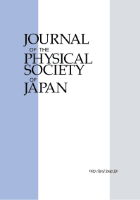
JOURNAL OF THE PHYSICAL SOCIETY OF JAPAN
Elevating the Standards of Research Excellence in JapanThe JOURNAL OF THE PHYSICAL SOCIETY OF JAPAN, published by the Physical Society of Japan, has been at the forefront of advancing knowledge in the field of Physics and Astronomy since its inception in 1946. With a commendable reputation reflected in its Q2 ranking within its category for 2023, this journal serves as a vital platform for disseminating high-quality research and innovative concepts. Researchers and professionals alike can engage with cutting-edge studies and reviews that span a diverse range of topics pivotal to the physical sciences. Although the journal does not currently operate with an open access model, it maintains a robust impact on the global physics community, evidenced by its placement in the 59th percentile among a competitive pool of 243 journals. With an unwavering commitment to bridging theory and application, the JOURNAL OF THE PHYSICAL SOCIETY OF JAPAN continues to inspire and cultivate scholarly discourse and collaboration across disciplines.

JETP LETTERS
Catalyzing Discoveries for the Next Generation of ScientistsJETP LETTERS, published by MAIK NAUKA/INTERPERIODICA/SPRINGER, is a prestigious journal in the field of physics and astronomy, which plays a pivotal role in disseminating groundbreaking research and innovative ideas since its inception in 1969. With an ISSN of 0021-3640 and an E-ISSN of 1090-6487, this journal aligns well with the interests of both seasoned researchers and emerging scholars, having achieved a 2023 category rank of Q3 for miscellaneous topics within physics and astronomy. Located in the United States at 233 SPRING ST, NEW YORK, NY 10013-1578, JETP LETTERS serves as a critical resource for its readership, offering exclusive insights and advancements across diverse areas of physics. While not open access, it hosts a collection of articles that refine theoretical approaches and experimental methods, providing both knowledge and inspiration to professionals and academics seeking to make impactful contributions to the scientific community. The journal’s quality is reflected in its Scopus ranking, where it stands at 39 out of 81 in the multidisciplinary category, placing it in the 52nd percentile, thus underscoring its significance and reliability as a scholarly outlet.
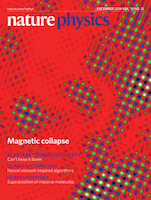
Nature Physics
Championing Excellence in Physics Research and CollaborationNature Physics is a premier journal dedicated to publishing high-impact research in the realm of physics, brought to you by the esteemed NATURE PORTFOLIO. With its ISSN 1745-2473 and E-ISSN 1745-2481, this journal has established itself as a vital resource for the physics community, enjoying a remarkable Q1 quartile ranking in the Physics and Astronomy category for 2023 and securing an impressive Rank #5/243 and a 98th percentile ranking in Scopus. Since its inception in 2005, Nature Physics has become a catalyst for innovation, featuring cutting-edge research that encompasses a broad spectrum of physics disciplines. Although it operates under traditional subscription models, it maintains a commitment to accessibility through selective publications and editorial excellence. Positioned in Berlin, Germany, this journal is a must-read for researchers, professionals, and students who seek to stay at the forefront of advancements in physics.